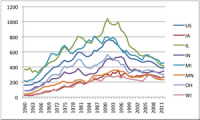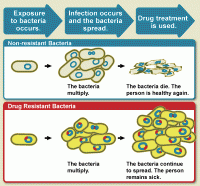-
Doctor-affiliated PACs fund candidates opposing gun safety policies
Researchers found that physician-affiliated political action committees provided more financial support to candidates who opposed increased background checks, contrary to many societies’ recommendations for evidence-based policies to reduce firearm injuries.
-
-
Reducing Illinois gun violence

Illinois could reduce the number of people killed each year by gun violence by implementing ten policies supported by available research, according to a new report. The Johns Hopkins report identifies weaknesses or gaps in current Illinois law and offers recommendations to reduce gun violence.
-
-
Antimicrobial resistance: A neglected biodefense vulnerability

We typically think that biodefense is about defending against bioterrorism or the next pandemic – or, in extreme cases, about some laboratory accident. Biodefense is mostly about all these things, but also about much more. Antimicrobial resistance is not a headline-grabbing topic and it certainly is not getting its own apocalyptic outbreak movie anytime soon, but the microbial threat has been growing since antibiotics were first discovered.
-
-
Measles spreading in U.S., mostly among unvaccinated children

Measles is spreading in the U.S. As of 5 February, there were 50 cases in Washington state and five in Houston. New cases are being added daily. Health officials, including the U.S. surgeon general, are urging parents to get their children vaccinated.
-
-
A global wave of measles cases fed by conspiracies and misinformation has health officials worried

The number of people infected with measles keeps rising in the Washington State and neighboring Oregon. Rick Noack writes that “complacency over vaccinations has been accompanied by outright rejection of the scientific evidence on measles vaccines that has saved over 21 million lives since 2000, according to the WHO. Unsubstantiated conspiracy theories on supposedly negative side effects of vaccinations, either against measles or in a broader context, have gained momentum in some communities, in the United States and other countries.” He notes that deliberately spreading misinformation on vaccines to suggest that citizens are being lied to by their leaders has become a go-to recipe of some populist politicians. Thus, after years of railing against vaccines and even proposing a law against them in 2015, Italy’s Kremlin-supported Five Star Movement is now part of the country’s government.
-
-
Comparing technologies to remove arsenic from groundwater
At least 140 million people in 50 countries have been drinking water containing arsenic at levels above WHO guideline. A new study compares for the first time the effectiveness and costs of many different technologies designed to remove arsenic from groundwater.
-
-
Increasing murder rate is erasing gains in life expectancy among Mexican men
The murder rate in Mexico increased so dramatically between 2005 and 2015 that it partially offset expected gains in life expectancy among men there, according to a new study. “It’s common to see news reports about the toll that drug- and gang-related murders are taking in Mexico,” says UCLA’s professor Hiram Beltrán-Sánchez. “This study confirms that homicide is so widespread that even when considering all causes of death, it stands out as a factor in slowing growth in men’s life expectancy.”
-
-
Review of the “Digitization of WMD” symposium
The digitization of biological and medical science is providing exciting and promising new pathways for improving health and daily life for mankind and our environment. The possibilities for new treatments, better fitness, and less prevalence of genetic diseases are numerous. However, these technologies and the information associated with emerging techniques carry certain risks and vulnerabilities. It is through understanding these risks and continuing to develop mitigation strategies for them, especially during the technology conceptualization and development phases, that we can continue to build promising new tools to improve life with confidence while addressing how they should be properly used.
-
-
Denmark starts building anti-swine border fence
In a controversial move, Denmark, hoping to stop the crossing of disease-carrying German swine into the hog farming region on Denmark, has begun building a border fence along its 40-mile border with Germany. Denmark says the fence is essential for saving the Danish hog farming industry from collapsing. Denmark is the only European country where pigs outnumber people. The country exports about €4 billion of pork each year.
-
-
Death in the air: Revisiting the 2001 anthrax mailings and the Amerithrax investigation
Time may have dimmed the memory of the 2001 anthrax attacks and the sense of urgency surrounding the efforts to identify the attacker. The attacks, which involved mailings of five anthrax-laced letters to prominent senators and media outlets, killed five individuals and made seventeen others ill. The anthrax mailings played a crucial role in raising concerns over possible terrorist use of biological agents in attacks against the homeland. As a result of the anthrax scare, Americans’ perceptions of terrorism came to include an existential fear of biological terrorism.
-
-
Measles spreads in anti-vaccination community in Oregon
An outbreak of measles spreads across a “hot spot” anti-vaccination community near Portland, Oregon. Twenty-three cases have been comfirmed, with twenty of those who contracted the highly contagious virus not vaccinated against measles because of their anti-vaccination beliefs.
-
-
WHO: Migrants do not bring diseases into Europe
A new report by the World Health Organization disputes a belief that refugees and migrants bring exotic communicable diseases into the European region. The report is based on evidence from more than 13,000 documents. It provides a snapshot of the health of refugees and migrants who comprise about 10 percent of the nearly 1 billion population in 53 European countries.
-
-
What we know about the effectiveness of universal gun background checks
This Tuesday, newly dominant House Democrats revealed legislation that would require all gun buyers go through a background check, regardless of whether they buy a weapon from a licensed dealer, collector at a gun show, or stranger in a parking lot. Universal background checks are popular and enjoy political momentum. Poll after poll shows they win near universal approval. But it’s worth asking how effective universal background checks are at reducing gun violence. And the real-world evidence that they reduce crime is more complicated than the political momentum might suggest.
-
-
National Collaborative on Gun Violence Research releases first request for research proposals
The National Collaborative on Gun Violence Research, a philanthropic fund created to support scientific research on gun policy, earlier this week released its first request for proposals to support up to $10 million in projects during its first grantmaking cycle.
-
-
Unfounded myths used to justify policies of exclusion: Lancet
Public health protection and cost savings are often used as reasons to restrict migrants’ access to healthcare or to deny them entry. Yet, as the new report lays out, the most common myths about migration and health are not supported by the available evidence and ignore the important contribution of migration to global economies.
-
More headlines
The long view
Ransomware Attacks: Death Threats, Endangered Patients and Millions of Dollars in Damages
A ransomware attack on Change Healthcare, a company that processes 15 billion health care transactions annually and deals with 1 in 3 patient records in the United States, is continuing to cause massive disruptions nearly three weeks later. The incident, which started on February 21, has been called the “most significant cyberattack on the U.S. health care system” by the American Hospital Association. It is just the latest example of an increasing trend.
